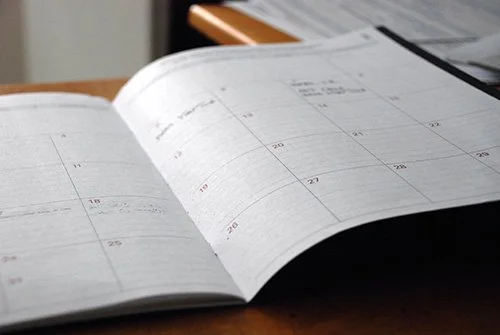Am I Doing Too Much?
Takeaway: If you have the suspicion that you're doing too much, you're in the right place. In this post, I'll explain signs you may be doing too much and how you can stop taking on too much.
We live in a society that values being busy. In order to keep up, we find ourselves constantly hustling, grinding, and working.
Of course, there is nothing inherently wrong with being busy. Staying occupied has benefits, such as allowing us to be involved with many different passions and providing a healthy distraction.
However, packed schedules can start to feel overwhelming after a while. On one hand, you feel the need to make time for everything--but part of you may also start to wonder if you’re trying to do too much.
The fact that you’re asking yourself this question is telling.
It can be difficult to admit that you’re struggling to keep up. With that being said, it’s important to acknowledge and honor your needs.
Hi, I'm Justine Carino, a therapist in Westchester. In this article, we’ll cover some signs that you may be taking on too much--and what to do about it.
Let’s dive in.
Five signs you may be doing too much
Your schedule is packed
On one hand, having a full calendar can be a good thing. It can make you feel productive, and it can be nice always knowing what’s coming next.
However, when your schedule is so packed that you have to plan every little thing down to the minute, you may be trying to do too much.
Having back-to-back appointments in your calendar leaves little room for error. If a meeting runs over or you hit traffic on your commute, your entire schedule could suffer. This creates a domino effect that can feel detrimental when your schedule is tight.
If the stress of a full calendar is starting to weigh on you, it may be time to consider a different approach.
You feel overwhelmed, scattered, or burnt out
These feelings are all warning signs that you may be doing too much.
Overwhelm can present itself when your schedule is overflowing with appointments and responsibilities. As a result, you may be constantly thinking about what you have to do next, making it difficult to focus on the task at hand.
This constant expenditure of your mental energy can be stressful. When you’re stressed for a long period of time, you’re at risk for burnout, leaving you feeling completely exhausted and depleted.
If any of these experiences sound like you, it’s time to seriously consider that you may be taking on too much.
Even enjoyable activities feel like a chore
It’s okay to be busy as long as you have the opportunity to unwind and enjoy hobbies, spend time with loved ones, and relax.
However, feeling too exhausted to do any of those things is a sign that you may be doing too much.
Everyone needs the chance to come down from the stress associated with the tasks of our day-to-day lives. If you find that you’re stuck in a constant state of stress without being able to unwind, it may be time to reevaluate.
You notice physical symptoms
In addition to mental and emotional exhaustion, you may start to notice physical symptoms when you’re piling too much on your plate. Feelings of tiredness, muscle tension, headaches, and stomach issues can all be physical manifestations of stress.
It’s important to speak with your medical provider if you have concerns about your symptoms. However, keep in mind that our minds and bodies are intimately connected--if your mind is stressed, your body will be too.
The quality of your work is suffering
There is truth to the adage “quality over quantity.”
When you have too many responsibilities, you cannot spend enough time with each one. You rush through each task, trying to make sure that we will stay on schedule.
Speeding from activity to activity deprives you of the opportunity to attend to each task with the care and attention it requires. Even if each task is technically being completed, the work may not be of the best quality.
If you find yourself rushing through each task just to check the box off your to-do list, it may be time to reflect on whether you’re taking on too much and letting the quality of your work suffer.
How to stop yourself from taking on too much
If learning these warning signs has led you to believe that you may be trying to do too much, keep reading for strategies to combat that behavior.
Schedule breaks in your day
Feel like you have absolutely no time for a break? That’s exactly when you need one the most.
Many people struggle to slow down when they have a full calendar or long to-do list. However, continuing to push yourself past your limits isn’t sustainable.
If the thought of organically taking a break when you need one is too intimidating, start by scheduling breaks in your day. Carve out 15 minutes to take a short walk, enjoy a cup of coffee, or just breathe.
By scheduling a break, you give it the same importance as an appointment or meeting. Treat it as one--make it a non-negotiable part of your day.
Practice saying “no”
Simply saying “no” is easier said than done, especially if you’re a chronic people-pleaser or workaholic. However, creating boundaries is essential to protect your energy and wellbeing.
Of course, not every task on your to-do list is optional, but it’s likely that some are. Do you need to take on another project at work, or can you delegate at least part of it? Do you really want to go to that function, or do you need some time to yourself? Does grocery shopping need to happen today, or can it wait until tomorrow?
Saying “no” sometimes does not make you lazy or incapable. Rather, it’s a way of setting healthy boundaries for yourself.
Break the cycle with the help of a therapist
It can be difficult to change your behavior patterns. If you think you’re trying to do too much but aren’t sure how to stop, working with a therapist might help.
Therapy can help you gain insight into your thoughts and actions. With the help of a therapist, you can also learn ways to change your patterns and live the kind of life you want for yourself.
If you’re located in the state of New York and interested in learning more about how therapists like myself can help you on this journey, I encourage you to reach out today.
Learn how to stop doing too much with the help of a therapist
I help teens and twenty to thirty-somethings navigate their lives. If you’re struggling with taking on too much, I can help you break the cycle. Start the process by contacting me today. I'm a therapist in Westchester, so I can help you in therapy if you live in New York state. Don't forget to utilize my resource "Your Personal Wellness Routine". Get your copy here!
I also have an online course, The Path to Peace, that helps the people-pleasing, perfectionistic, overachiever learn evidence based treatment methods to manage anxiety in 7 days. To learn more about my program, click here.
If you are a people-pleaser that struggles to say “no” and ends up doing too much, click here to take a two-minute quiz to clarify and uncover your need to please. After you connect with your personal archetype, you'll receive resources to support you in overcoming those pesky people-pleasing tendencies!
MEET THE AUTHOR
Justine Carino
Justine is a licensed mental health counselor with a private practice in White Plains, NY. She helps teenagers, young adults and families struggling with anxiety, depression, family conflict and relationship issues. Justine is also the host of the podcast Thoughts From the Couch.







